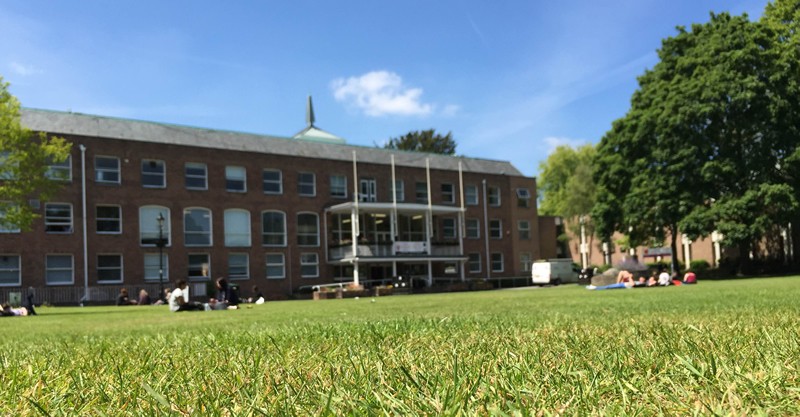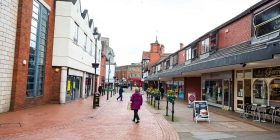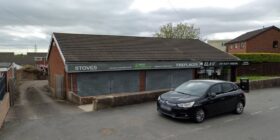Full Council on track to decide country parks & disabled parking charges as consultation goes ahead

An attempt to get the Executive Board to reconsider how they carry out a consultation into charging for disabled parking and at Wrexham’s country parks failed after a lengthy two and a half hour debate.
The call-in meeting was explained to members of the employment, business and investment scrutiny committee as being more of a ‘technical meeting; rather than scrutiny of decisions itself – with the call in reasons before the meeting being the topic of debate. However that point was lost on some of the councillors taking part.
The call-in notice from Welsh Labour councillors claimed the Council’s Executive had failed in numerous ways, including informing councillors of the financial implications, any risks to the Environment Budget, and if mitigation plans were in place for any unintended displacement affects for various parking charge changes.
The call-in notice explained that due to this they felt the decision to start a necessary statutory legal consultation was ‘premature’, and in essence there should be a new decision – effectively to start a consultation with all the allegedly missing information in place before going out to get the views of the public or specific groups.
That was the ‘calling in’ of the decision, so the committee would decide if they thought that was the case, and if so refer the decision back to the Executive Board to reconsider the decision, or not. If referred back Executive Board could either stick or alter their original decision, which would then be immune to further call-in.
The decision would mean a consultation would take place either way, and the decision on introduction on charges would still be subject to approval by councillors at a Full Council meeting scheduled for 21 February 2018.
With that backdrop some councillors took the opportunity to re-run the debate on if charging for disabled parking, or if charging for parking in country parks is a good thing or not, rather than focusing on the five points up for debate on the call in.
Officer guides the meeting this should be a ‘quick process’, explaining it is *not* a scrutiny of the decision, just if its to be referred back to the Executive Board or not. Lets see if that happens!
— Wrexham.com (@wrexham) February 7, 2018
The responsible Lead Member for Environment and Transport, Cllr David A Bithell was on hand to answer questions, along with the relevant council officer plus various other council staff. Cllr Bithell appeared to have a pre-prepared set of statements to answer each of the five points in turn, but was happy to add further detail when requested.
Cllr Derek Wright presented each formal question on the call-in notice, with several appended queries to each where possible. Members of the committee also posed questions, which ranged from anecdotal evidence to specific financial queries.
Cllr Marc Jones and Cllr Dana Davies queried on the basis the financial implications had not been made clear to Councillors, with questions on if figures presented were net or gross numbers.
News that parking machine and other costs are pencilled in as a £50k capital spend did appear to be new information to those on the cnommittee, which was then probed further by Cllr Marc Jones who asked if extra staff would be needed to empty machines or monitor the site – but was told no.
After a short grilling Cllr Marc Jones indicated he was still unhappy, stating: “All these figures are based on predictions of people using these services, what if they do not use them and they park on side streets?
“The £50k capital cost will not be recovered.”
Cllr Bithell noted that the debate was veering to the third point on the call-in notice, regarding mitigation on people using street parking instead of car parking.
Cllr Davies did some rough maths to point out she did not believe the figures presented added up, and invited clarity to where the £25k revenue sum came from – stating either she made £19k based on the figures and method infront of her.
Cllr Bithell disputed her numbers, pointing out that Cllr Davies was basing her figures off a £1 charge when some figures were off a £1.80 charge – a ‘confusion’ attributed to the difference in country park rates being in the same debate as disabled bay charging.
Clr Davies reads out a report giving the workings of the £25k figure, that apparently cites a £1.50 parking charge, that Clr Bithell says does not exist. Meanwhile a Council Officer has calc out on his phone doing something…!
— Wrexham.com (@wrexham) February 7, 2018
Cllr Davies said the figures had come from a previous meeting, however this was disputed again, with the formulae and forecasts being described as a ‘fluid process’ and based off ‘conservative estimates’.
After details on numbers of spaces and various calculations Cllr Davies said: “I am still not getting where the £25k is substantiated from, the figures do not add up, I am not sure where we have plucked the £25k from.”
Cllr Paul Jones interjected to call the £50k capital cost as ‘brand new information’, saying “Someone should have done a cost benefit analysis and shared it. This is what this call-in is all about.”
Head of Environment and Planning Lawrence Isted spoke to reassure the committee: “Whenever we are working out things like this we use our best judgement and best estimates. We do not over egg things.
“The capital costs are not new, or a new situation.”
Mr Isted added that the proposals were based on ‘previous work with our reshaping partners PWC’.
Cllr Paul Jones bluntly asked: “So why are we hearing about these costs now?”
Cllr Bithell replied to point out there had been five budget workshops, five extra scrutiny meetings before Christmas and that on the relevant scrutiny meeting before Christmas ‘there were not many questions on this.’
He added: “A lot of these costs are fluid until we come to a decision. It has been worked up with the help of Officers, and the Executive Board agrees the Budget.
“I did highlight at the Executive Board meeting there would be costs. There is not much rocket science behind this, it is standard procedure.”
Cllr Paul Jones was not swayed, accusing Cllr Bithell of ‘playing up the savings that are the good news, but underplaying the capital costs’.
Cllr Wright said he was ‘shocked’ by the £50k capital cost, saying it had been ‘magiced out of the air’.
He then asked about if savings were a single saving, or year on year ‘as there was nothing in the second column’. A question that had been asked many times in the set of scrutiny meetings before Christmas, as the documents before them had a Year 1 saving and a Year 2 saving.
As explained several times previously, and again at the meeting, the Year 1 saving was ongoing thereafter and any Year 2 saving would be new and on top – and ongoing as well.
Questions over risks were batted back by Cllr Bithell who gave a quick bleak overview over the budget of the Environment Department, ending with “if we do not generate income in one way or another we will have to cut services.”
Cllr Davies gave the analogy of putting a risk, if the proposals were unsuccessful and were a cost rather than a revenue raiser, on top of existing problems in the department, saying ‘It could make the situation worse not better, the risk is escalating, it is risk on another risk’.
The finance officer also pointed out that in a previous report before councillors an appendix had risks detailed.
Other questions in the call-in notice were dealt with in a similar manner, with it noted that the claim there was no mitigation for people being displaced to on street parking.
The council officer pointed out it was acknowledged in documents presented to councillors previously, pointing out that the majority of the town centre’s roads were subject to some kind of parking regulations already.
Cllr Marc Jones was particularly unhappy, stating: “It is human nature, people are price sensitive to parking. People will spend £100 in a shop but will not pay £1.80 to park.
“People will circle streets to look for a space than pay to park. We know what a problem parking in the town centre is, and as a result of this we will see people use side streets.”
“I was not on the council two years ago, and I am concerned we are looking at PWC modelling from two years ago, it is old information.”
Cllr Alun Jenkins made a very long speech giving a grim appraisal of the current austerity situation in the UK, and how he disagreed with the proposals being made, but did recognise the decisions before the council saying it was like ‘having both arms cut off but which one first’, adding he would prefer not to have either chopped off.
Cllr Jenkins was keen to get assurances that nothing would be progressed without consultation, which Cllr Bithell was happy to offer, as that was on the table either way.
Cllr Bithell pointed out to the meeting that the proposals were ‘not about deterring people from coming to the town centre, it is about making spaces accessible.’
Cllr Davies queried the consultation process, noting that it had been described several times as ‘implementing a traffic order’, “My understanding is we have to identify who we want to consult with, if we have a group with protected characteristics we should be consulting with them specifically.”
“It has been mentioned we would encourage them to take part on our website or in newspapers, but the public have to engage and to do that they have to understand the process and context. They need to know the information to make it a meaningful consultation. We are going through the motions with a traffic order.”
Cllr Bithell pointed out an impact equality statement had been ‘done’, describing it as a ‘fluid document’, and offered assurance that the statutory process would be followed.
The debate then turned to the principle of charging for disabled parking, with Cllr Bithell saying “It is about having accessible spaces” noting that Blue Badges were not means tested.
Cllr Paul Jones angrily pointed out a range of cases Blue Badges could be used for, stating very young children who were terminally ill, fixed income adults, veterans who were on fixed incomes, ending by stating the proposals were regressive “If they can’t afford to pay it, they do not have access”.
Cllr Tina Mannering gave a personal account of why she held her view, saying: “It is more about access and space not the money.
“Not all haven’t got money or funds, some are very well off, more than those working. It is about access than the cost of car parking.”
Cllr Paul Jones cited data that says there are 9,000 Blue Badge holders in Wrexham, saying that Cllr Mannering was ‘talking about one or two’.
Cllr Mannering said it was “Offensive to assume they do not have money, they are as equal as everyone else. It is not the money it is the access.”
Cllr Paul Jones said, “Some can afford it. Some can’t afford it. We do not know if 8,000 or how many can’t afford it.”
Cllr Mannering retorted, “If we do not consult we will not know.”
Cllr Paul Jones again reiterated why the call-in was made, to request a more detailed consultation: “I would expect Officers to know that before a decision was made, not to implement and hope for the best, not trade anecdotal stories, we should be working on hard evidence.”
The debate moved on to specific points, including asking if council enforcement was a seven day operation (it is) and it noted that if proposals proceed then Blue Badge parking on double yellow lines in Ty Mawr could increase. The meeting was told the yellow lines were brought in as a response to improve child safety at the park, and thus the proposals were seen by some as increasing risk on that front.
Cllr Trevor Bates says a £50 annual charge / pass to park at country parks in Wrexham ‘compares very favourably to a gym membership’
— Wrexham.com (@wrexham) February 7, 2018
The meeting headed past the two hour mark and just before 6pm Cllr Bithell left, leaving Cllr Marc Jones and Mr Isted to have an interesting exchange over revenue raising and cuts proposals recently.
Cllr Marc Jones said he had ’sympathy’ with officers on the proposals: “We are told we have to do these or do worse, and we are told to come up with alternatives. We are told ‘if you do not support this you have to find something else’. Really, we pay council officers to give us options. What are the other options?”
Cllr Marc Jones contrasted the health aims of Wrexham Council to the policy of charging for parking at country parks, and also pointed out it was not equal if councillors were able to park in the town centre cheaper than disabled people, adding: “How the hell is that equality?”
Mr Isted replied pointing out the goal of the lead member was likely to ensure no loss of services or core services and thus the proposals: “We used to call them efficiencies, then efficiency savings, and now we have to accept they are cuts.
“We went through a long list years back of ‘green’ things, like we used to do twinning, that went. Then we did the ‘amber’ things, and now we are in the ‘red’ area.”
Hinting at the ‘alternative options’, a grim pointer towards cutting of ‘core functions’ was made which the meeting was told would be made up of ‘largely reducing staff in core activities’, with the ‘worse case scenarios affecting the core functions of the council’.
Mr Isted concluded that the committee would not be wishing to do that, and thus the suggestions and proposals put forward.
Council Officer Isted gives insight to the land of plenty that was a decade ago at Wrexham Council, says easy cuts were made 10 years ago, then difficult decisions and now making ‘really difficult decisions’.
— Wrexham.com (@wrexham) February 7, 2018
Cllr Jenkins made another briefer statement, painting a bleak picture of where he felt things could head.
Clr Jenkins cites Northamptonshire Council that recently started emergency spending controls – says Wales is 3-4 years behind England, says ‘watch this space’ for Wrexham, “If austerity continues there is no point having councils”.
— Wrexham.com (@wrexham) February 7, 2018
With the doom and gloom and two and a half hours of debate appearing to sap the will of the committee to keep going, despite the frustration of Cllr Wright who pointed out he had ‘many more questions to ask’ proceedings headed towards a vote.
The choice before councillors was clear to some, despite the attempts to form a specific recommendation.
Finally it was basically agreed for a simple success v failure vote on the 2nd 3rd and 5th points of the call-in notice contents, and if the ‘case’ had been successful.
The motion was proposed by Cllr Davies and seconded by Cllr Marc Jones, with Cllr Mannering attempting a counter motion. The vote was about to proceed before Cllr Atkinson spoke to explain his view on the various points, explaining that he felt officers were aware of risks and the financial issues raised had been ‘clearly explained’.
A few members have gone, there is that rustling of bags, coats and pap…ipads indicating people are wanting to get going. Moving towards a vote finally!
— Wrexham.com (@wrexham) February 7, 2018
A point of order was called by Cllr Wright to point out the debate had ended and a vote was due and the Chairman Rodney Skelland should not allow further debate.
Clr Skelland now taking his time to form things up, think he is the one who would have to present back to Exec Board if committee votes that way. Does not sound enthusiastic !
— Wrexham.com (@wrexham) February 7, 2018
After two and a half hours the vote saw the proposal to refer the decision back to the Executive Board fall, with the councillors for and against neatly falling into party and administration alliance lines.
The Plaid Cymru (Cllr Marc Jones), Liberal Democrat (Cllr Alun Jenkins) and Labour (Cllr Paul Jones, Cllr Adrienne Jeorett and Cllr Dana Davies) members present voted to refer the decision back to the Executive Board.
Members of the Conservative group (Cllr Andrew Atkinson) and two Independent groups (Cllr Trevor Bates, Cllr Geoff Lowe, Cllr I David Bithell, Cllr Nigel Williams, Cllr Sonia Benbow-Jones and Cllr Tina Mannering) voting to reject the report going back to the Executive Board.
We don’t think the Chairman Cllr Rodney Skelland (Conservative) voted as per convention – however due to the layout of the room it was unclear due to the architecture, and we have no video or pictures to show you as the Councillors do not allow filming or the taking of pictures of raised hands.
A final decision is set to be made at Full Council on Wednesday 21st February. The meeting is open to the public.
VOTE: Scrutiny (5 v 7) decide NOT to refer the decision back. So Exec Board decision stands as below… pic.twitter.com/9EGUHcDfFR
— Wrexham.com (@wrexham) February 7, 2018
Spotted something? Got a story? Email [email protected]












